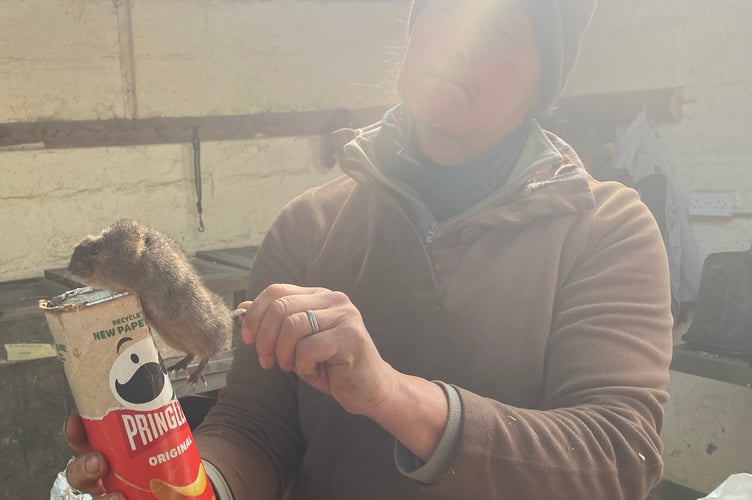You do not expect stork to be standing in a West Devon field, but the striking white birds are there in force.
They are among several endangered native species which are part of a project at Lifton, near Broadwoodwidger, which returns birds and animals to the wild.
The idea is to increase biodiversity and enrich wildlife on rural land which is largely barren of animals and the food chain which supports them.
Derek Gow runs the project under his business the Derek Gow Consultancy which specialises in water vole conservation, surveys, breeding and reintroduction and mitigation – among other protected British mammals and reptiles. He works with clients on the ethical mitigation of developments.
His consultancy and staff, who include local farmers’ wives, with their intimate knowledge of the land, are dedicated to reversing the decline of the water vole populations. He has dealt with black grouse, beavers, long-horned cattle, curlews, turtle doves, wild cats, twites, lapwig and redshank and adders.
Derek explains the importance of water voles: “We’ve rewilded thousands of water voles because they are an important part of the ecology. They may be small, but nature’s health begins underground and they are subterranean creatures which make a network of burrows next to water. The burrows themselves provide an ecosystem which stimulates root growth and provides habitats for other life forms.
“It is an example of how everything is inter-connected and related in nature and if we interfere on a big scale then there are so many repercussions.
“The biggest harm has come from chemical put on the land. You can dig clod after clod of earth on a field in West Devon and see may be one or two worms which is a terrible state for the so to be in – that’s where life starts and it all follows with the food chain.
“The landscapes in this country have largely become factory floors supporting little or no life.
“If no insects are adding value to the soil then there will be no plants that grow from the soil. This means there’s no food for the birds and then they aren’t dropping and spreading seeds from berries and there’s no pollen for the insects which are also food and pollinators.”
Derek has tried to return his land to nature by reducing sheep grazing and has seen increased bird life which is an encouraging sign.
He was influenced in his passion for improving wildlife diversity by Gerald Durrell, a renowned naturalist and writer who pioneered zoos for captive breeding endangered species. He was then inspired, while attending the Durrell Conservation Academy, during his training to meet conservationists who risked their lives worldwide to save species.
“We can be very complacent in this country about what we are doing, but there have been sone big achievements in Europe like white-tailed eagles which have been reintroduced to the outskirts of Amsterdam. We need to do much better.”
Derek is now creating a charitable foundation, complete with a membership to broaden the appeal of the project.

-of-Azets-which-will-be-holding-a-seminar-at-Strawberry-Fields-in-Lifton-on-Feb.jpeg?width=209&height=140&crop=209:145,smart&quality=75)


